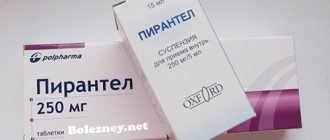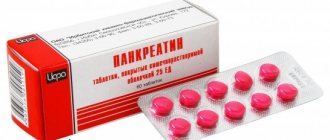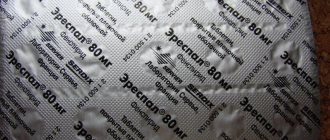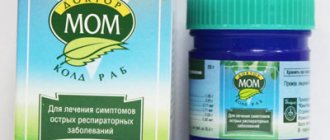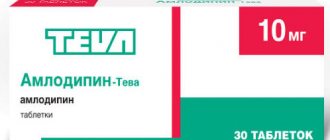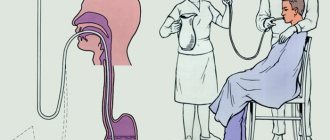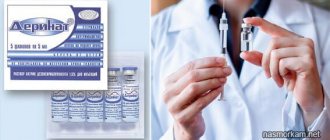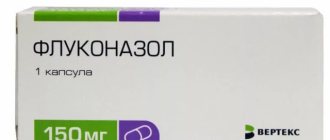Similar drugs
There are no complete analogues of Sinupret in composition. But if the child has contraindications, it is recommended to select a drug with a similar mechanism of action.
Popular analogues of Sinupret with similar effects:
- Tonsilgon N is a combination herbal preparation that has anti-inflammatory and immunomodulatory effects. Pharmaceutical forms: tablets and drops for oral use. Ingredients: chamomile, marshmallow, oak bark, walnut, dandelion, etc. Tonsilgon is used to prevent and treat respiratory diseases of the upper airways.
- Cinnabsin is a homeopathic remedy for the treatment of inflammatory diseases of the nasal cavity. Lozenges contain the following ingredients: echinacea, golden root, cinnabar and potassium bichromate. Prescribed to children from 2 years of age.
- Gelomirtol is a herbal medicine based on myrtol with antimicrobial and expectorant effects. Pharmaceutical form – enteric-coated capsules. The drug is used to treat sinusitis and bronchitis. The medication thins mucus and speeds up its release. The drug is contraindicated in bronchial asthma.
- Umkalor is a popular medication for eliminating infection from the upper airways. The drug based on Pelargonium sidoides destroys viruses and bacteria and stimulates local immunity. The pharmaceutical form is a solution for oral use, which is prescribed to patients over 1 year of age.
- Rinofluimucil with acetylcysteine and tuaminoheptane thins mucus in the nose, accelerates its release, and eliminates inflammation. The drug is prescribed to children from 3 years of age. The therapeutic course lasts no longer than 1 week.
- Sinuforte is a popular drug based on natural ingredients that is used for inflammatory diseases of the nose and paranasal sinuses. The powder is mixed with a solvent and irrigated onto the nasal mucosa. The drug is prescribed to patients over 5 years of age.
- Isofra is an antimicrobial drug based on framycetin sulfate for the treatment of runny nose of bacterial origin. The local antibiotic is effective against staphylococci, Escherichia coli, Pseudomonas aeruginosa, etc. The medication is prescribed to children from 1 month of age.
These are the main analogues of Sinupret, which can cope with prolonged runny nose in children of different ages.
Thus, Sinupret is a drug with natural ingredients that is allowed to be taken by children from 2 years of age (except for pills). The medication rarely causes adverse reactions and can be combined with anti-inflammatory drugs or antibiotics. To avoid side effects, parents should follow the pediatrician's recommendations regarding taking the medication.
Side effects
Adverse reactions can also sometimes occur. They appear like this:
- diarrhea may occur;
- nausea and vomiting;
- slight stomach pain;
- skin rash, redness;
- dyspnea;
- allergic manifestations;
- state of discomfort.
If symptoms do not resolve during treatment, treatment should be discontinued by notifying your doctor.
Before using Sinupret cough drops, you should shake them slightly. Shelf life 4 years from the date of issue. Once the medicine has expired, it will be ineffective and should not be taken. The drug can be used for up to 6 months from the date of its opening. Store in a place out of direct sunlight, so that the air temperature does not exceed +30 degrees. The syrup must be hidden from children.
The product is available in a dark glass bottle with a capacity of 100 ml with a drop dispenser cap, with which it is convenient to measure the dose of the medicine.
When a child coughs, a label with a medical dosage should be placed on a bottle of Sinupret syrup so that you remember it and do not cause an overabundance of the substance in the child’s body.
The medicine is sold in pharmacies without a prescription.
Reviews of Sinupret for cough indicate that it is an excellent medication for treating various diseases of the larynx and nasopharynx. Included in medical recommendations. Removes swelling, cough, and brings the rheology of the mucous membranes from the sinuses to an optimal state. It is prescribed as part of complex therapy. Suitable for follow-up treatment. It is well tolerated and there are no side effects when taken correctly.
Previously, it was prescribed to children from 2 years of age, but now the age has been changed (from 6 years). Not recommended for nursing women.
For recurrent acute or chronic sinusitis, it is possible to take a course of 2-3 months.
Comparison of similar drugs
Sinupret and GeloMyrtol
GeloMyrtol is closest “in spirit” to Sinupret. What unites them:
- German production;
- herbal preparations;
- have a secretory-diluting effect;
- indicated for sinusitis.
GeloMyrtol contains extracts of essential oils. Available in the form of capsules with an oily liquid inside.
At the same time, GeloMyrtol has certain disadvantages:
- Contraindicated for pregnant and lactating women;
- not allowed in the presence of stones in the gall bladder or kidneys;
- should be taken frequently (4-5 times a day);
- more expensive than Sinupret.
Thus, all other things being equal, Sinupret seems to be a more attractive drug.
Sinupret and Cinnabsin
Cinnabsin is produced by Deutsche Homoopathie Union. Unlike Bionorica, which works in the field of phytomedicine, Deutsche Homoopathy Union specializes exclusively in homeopathic remedies.
Homeopathic remedies are substances that do not have proven healing properties, and are often poisons (in highly diluted concentrations). Taking such drugs by a healthy person can provoke the appearance of symptoms of the disease. Homeopathy is based on the assertion that if such a drug is taken by a sick person, its destructive effects will lead to a cure for the person (the principle of “like with like” treatment).
For example, Cinnabsin contains red mercury sulfide. Obviously, mercury is poisonous to humans. Meanwhile, patients who have used Cinnabsin to treat sinusitis testify to the effectiveness of this drug.
Cinnabsin is available in capsules. The manufacturer notes that this product has anti-inflammatory and immunostimulating effects. Indicated in the complex treatment of sinusitis.
Apparently, in a pair of Sinupret and Cinnabsin, the first remedy has a better safety profile and is more trustworthy.
Sinupret and Euphorbium compositum Nazentropfen S
Euphorbium is another homeopathic medicine with a composition that is extremely difficult for the average person to understand.
Contains substances such as: pulsatilla pratensis, hepar sulfuris, argentum nitricum, etc. The manufacturer, a German pharmaceutical company, recommends using it for sinusitis (in complex therapy) as a decongestant and secretion-thinning agent.
There are different reviews about Euphorbium. There are also those who talk about the complete ineffectiveness of the drug and, moreover, about increased nasal congestion after its use.
Sipupret is likely to be a more appropriate drug for sinusitis.
Sinupret and Sinuforte
Sinuforte receives excellent consumer reviews. Being a plant-based drug, the product is characterized by a unique method of action. The extract of cyclamen tubers contained in Sinuform has a stimulating effect on the trigeminal nerve, which in response leads to increased secretion in the nasal sinuses and cavity. As a result, the accumulated secretion dilutes, begins to be intensively removed, and drainage of the sinuses improves. The irritating effect of the drug lasts an hour or more.
Sinuforte appears to be more effective than Sinupret. However, its high cost makes it less attractive to consumers.
Dose and dosage forms
For children, Sinupret is prescribed in syrup or drops. The medicine can be given starting from 2 years of age. The dosage of Sinupret for cough should be selected by a doctor. But if there were no special recommendations, then you need to follow the instructions.
Important! Spontaneously taking Sinupret in a dose higher than that given in the instructions is prohibited. It is allowed to take the drug according to a regimen that differs from the standard one, only as prescribed by a doctor.
Drops are approved for use from 2 years of age. It should be noted that they are produced with 19% ethanol and do not contain sweeteners, so children are given the medicine to drink along with sweet drinks (juice or tea).
People suffering from gastrointestinal diseases should take Sinupret after meals. You don't have to take the drops.
Analogs
Sinupret has no analogues for the active substance, but there are a number of drugs with a similar effect or one of its components in the composition. These include the following medications:
- Aflubin. Also contains gentian extract. Additionally includes iron phosphate, lactic acid, bryonia dioica, aconite. The drug has antipyretic, immunomodulatory and anti-inflammatory effects. The medicine is also taken orally undiluted.
- Phytoflox. This medicine is a herbal tea with anti-inflammatory and diaphoretic effects. The base is linden flowers, elderberry, peppermint, chamomile and rosehip. Tea increases the resistance of mucous membranes to infection in respiratory diseases.
- Coryzalia. This product is available only in tablet form. The basis is medicinal herbs. The drug itself belongs to the homeopathic category. More often it is used in the treatment of sinusitis, rhinitis and other diseases accompanied by nasal congestion, sneezing and rhinorrhea.
The pharmacological properties of the listed drugs are slightly different. Analogues of Sinupret that are more similar in composition and indications are as follows:
- Theraflu Bro;
- Suprima broncho;
- Doctor Mom;
- Kofex;
- Bronchostop;
- Tonzilgo N;
- Insti;
- Tonsipret;
- Pentaflucin;
- Imupret;
- Atma;
- Antigrippin-ANVI;
- Travisil;
- Stodal.
"SINUPRET": which analogues are cheaper?
If you have contraindications to the use of the medication or experience symptoms similar to allergic ones, you should immediately stop using it, as it may harm your health. We recommend worthy analogues:
| Tonsilgon . The main distinguishing feature of this product is its composition, but otherwise, they are similar down to the release forms. The medicine is prescribed when tonsillitis, laryngitis or pharyngitis are detected. Although the components of the drugs vary, they are also based on natural herbs, chamomile, dandelion. Price category - from 300 to 400 rubles; |
| Coryzalia . The main advantage of the medication is that it can slow down and reduce the activity of viruses that have penetrated deep into the respiratory tract. Also, mainly, it eliminates swelling, soothes the nasal mucosa, thereby preventing the appearance of a runny nose. Doctors have different opinions about the effect of this medical product; it only helps a little to cope with the problem, but cannot eliminate it. On average, a pharmaceutical product costs from 200 to 250 rubles; |
| Rinofluimucil . Available in spray form, it is effective for many diseases. It is prescribed for acute, chronic or vasomotor rhinitis, and sinusitis. Pharmacists can easily find the difference between these drugs; the analogue acts locally, without spreading to the entire respiratory system, and is limited only to the nasopharynx. Costs from 270 to 300 rubles; |
| Erespal . Optimal and up-to-date replacement for the original. It differs in its composition, so Sinupret is recommended for people with personal intolerance. Has a strong effect from the nasopharynx to the lungs. Product price - from 350 rubles. |
Use of Sinupret during pregnancy and breastfeeding
The use of Sinupret during pregnancy and breastfeeding is an extremely controversial issue. Due to the presence of ethanol and a large amount of sugars in the syrup, the manufacturer has designated pregnancy and lactation as contraindications for its use. Despite this, some doctors still prescribe this form of Sinupret to pregnant and lactating women. Is it correct?
In fact, the question is quite complex and the answer to it depends on the characteristics of a particular case. Typically, the use of Sinupret syrup during pregnancy or breastfeeding is prescribed only if not taking the drug would pose greater risks to the health of the mother and child than its use for therapeutic purposes. Naturally, the advisability of using the medicine is determined solely by the attending doctor, and expectant or nursing mothers should not even think about self-medication with Sinupret.
Primrose flowers with calyx
For medicinal purposes, this medicinal plant is collected in early spring: in April. The plant is rich in beneficial substances such as flavonoids, phenolic glycosides, carbohydrates, salicylic acid and essential oil. A set of such invaluable components helps in the treatment of not only the upper respiratory tract, but also the bronchi. Primrose flowers help increase the activity of the ciliated epithelium, relieve bronchospasm, increase the secretion of the glands of the upper respiratory tract, and have antibacterial activity.
Its flowers are used in the syrup due to the fact that they contain glycosides and flavonoids, essential oil and saponins, mucous substances (they provide a softening effect) and tannic, organic acids and vitamin C. With their help, the inflammatory process is reduced and expectorant properties are manifested. Also, elderberry flowers have astringent and analgesic properties, emollient and wound-healing, astringent and antipyretic. Therefore, this medicinal plant is constantly used for therapeutic purposes during colds, sore throat, hoarseness, bronchitis and laryngitis.
Price of Sinupret tablets
The cost of Sinupret varies from 319.00 to 592.00 rubles (Moscow). The table shows approximate prices and availability of the drug in pharmacies:
| Pharmacy name | Drug name | Price (rubles) |
| Good pharmacy on Zelenodolskaya, Moscow, st. Zelenodolskaya, 45, building 1 | Sinupret tablets No. 50 | |
| REDapteka, Moscow, st. Pervomaiskaya, 42 | Sinupret tablets No. 50 | |
| Triumph, Moscow, Mitinskaya st., 27, bldg. 2 | Sinupret forte tablet. No. 50 | |
| Astra, Moscow, st. Flotskaya, 13, building 3 | Sinupret tablets No. 50 | |
| Eco World, Moscow, st. Marshala Katukova, 24, building 5 | Sinupret tablets No. 50 |
The leading cause of children's runny nose is the impact of the virus. If your overall health is cheerful and nasal breathing is not impaired, then there is no serious cause for concern. The body responds to the invasion of a respiratory infection by increased production of mucus, which neutralizes the pathogens. The well-known pediatrician E. Komarovsky suggests at first not to give medications specifically for a runny nose, to give children water more often and to moisten the nose.
The picture is completely different if the mucus is very thick, interferes with normal breathing and becomes a breeding ground for bacteria. Sleep and appetite are disturbed, headaches, feelings of weakness and fatigue are common, and the quality of life is significantly reduced. The child begins to breathe through his mouth. Unfiltered and cold air creates conditions for the development of complications.
The popular drug Sinupret, created on the basis of plant materials, fights thickened mucus in cases where the runny nose becomes protracted. The main task of the medication is to restore normal nasal breathing.
Sinupret for cough - instructions for use
During colds or to prevent viral diseases, many people prefer to take homeopathic medicines. They have a gentle effect on the body, are easily tolerated and do not cause severe adverse reactions. These include Sinupret. It is part of the group of combined antiviral agents that relieve inflammation and strengthen the immune system. It is prescribed to adults and children in a certain dosage. Patients note the effectiveness of the medication. Sinupret relieves a runny nose and eliminates coughs of any origin.
According to statistics, the drug is in fourth place out of 40 known similar drugs. Natural chemical compounds in its composition have a positive effect on the human body with weakened immunity. "Sinupret"> is suitable for those for whom drug treatment is contraindicated. In a short period of time it is able to destroy different types of viruses and get rid of the disease that has overtaken it.
Composition and properties of syrup
Sinupret syrup is a herbal preparation that has anti-inflammatory and decongestant properties.
Sinupret syrup is a hypoallergenic and very effective medicine. This form of the drug is presented specifically for the youngest patients in order to make it easier for them to take the medication. The syrup contains exclusively natural ingredients, which simply rarely cause an allergic reaction and provoke side effects.
The main components of Sinupret are:
- primrose and elderberry flowers
- verbena herb
- gentian roots
- sorrel leaves
After high-quality and unique pharmacological processing, the mixture of these plants turns into a medicinal syrup on a water-alcohol basis (approximately 9%). In terms of action, Sinupret syrup is multifaceted.
The basis of its effect on the body is the following properties:
- secretomotor
- secretolytic
- anti-inflammatory
- immunomodulatory
- mild sedative
The symbiosis of the components of the drug makes it completely hypoallergenic, as a result of which the syrup is perceived by the human body completely normally, acts gently and quite quickly. If we start from a person’s feelings, then Sinupret will help facilitate the removal of mucus from the nasopharynx, sputum, eliminate mucostasis, reduce all manifestations of a runny nose and, in general, carry out general toning of the body. By the way, very often the syrup in question is prescribed together with antibiotic drugs, significantly increasing the effect of taking them.
Release form, storage and shelf life
The drug Sinupret is available in various forms, each of which is convenient for a specific age group of patients. In addition to syrup, you can also find tablets, dragees and drops. The form of the drug being considered today is made specifically for the youngest patients, as it does not cause any difficulties for them in terms of administration.
The design of the packaging and the bottle itself is dominated by green colors, so it is almost impossible to make a mistake in choosing the right drug. The expiration date of Sinupret syrup is always indicated on the packaging. In general, it is:
- 4 years without opening the bottle
- 6 months after opening the bottle
Proper storage of the drug will help to avoid premature spoilage. The manufacturer recommends storing the syrup out of reach of children at a temperature of no more than 30 degrees Celsius. It is not allowed to pour the drug from the original container. The formation of a light sediment or a slight change in the color of the syrup during storage is allowed and is a completely natural manifestation.
Good remedy
To get rid of this unpleasant manifestation, the pharmacological industry offers a large number of drugs, of which many people prefer Sinupret cough syrup. The main thing is that it allows you to quickly get rid of an attack, restore the functioning of the respiratory tract thanks to natural beneficial components, and is completely harmless. It can be used by all family members: from children to the elderly.
Sinupret medicinal syrup and cough tablets contain plant extracts that for many centuries have helped cure coughs and generally improve the health of the respiratory tract. In combination, all natural components normalize the functioning of the respiratory system and alleviate the symptoms of respiratory diseases. Having a complex effect, they relieve the inflammatory process and reduce the viscosity of sputum, improve the functioning of the mucous membranes, and normalize the protective functions of the epithelium of the respiratory tract.
Sinupret drops
The drops are a brownish transparent liquid with a bright aromatic odor and bitter taste.
This form of the drug can be prescribed from 2 years of age. It is used for internal use: 15 drops are dissolved in a small amount of boiled water and drunk by the child. Repeat 3 times a day.
For older children: 3 times a day, 25 drops.
For adults over sixteen years of age, the dosage rate is 50 drops with the same frequency.
If necessary, the dosage can be doubled.
It is especially worth noting that Sinupret drops are intended exclusively for oral use. They have an excellent therapeutic effect for a runny nose, chronic and acute inflammation of the paranasal sinuses (sinusitis and sinusitis), and inflammation of the respiratory tract with the formation of sputum (tracheitis and bronchitis). But most often, drops are used as one of the significant advantages of combination therapy.
Features of Sinupret drops
When storing drops, sediment may form or the liquid itself may become cloudy. This is a normal phenomenon that does not affect the effectiveness of the product. Shake the bottle before use.
Over the many years of practice of using Sinupret drops during pregnancy and lactation, there has not been a single case of contacting a doctor about this, which indicates the safety of the drug. However, in any case, if you belong to a risk group, it is better to consult a doctor. After all, only he will be able to compare the potential risks and benefits of taking it, and make a verdict.
Sinupret in the form of dragees or tablets
From 6 to 16 years, 1 tablet 3 times a day.
Over 16: 2 tablets, 3 times a day
The only difference between dragees and tablets is that the former are equipped with a healthy layer, a shell that is resistant to the action of saliva and gastric juice, which allows the drug to enter the small intestine without loss, where it is absorbed by its walls.
It is better to drink the pills with a small amount of water and never chew them. The destroyed shell allows active enzymes of saliva and gastric juice to penetrate the drug, which reduces its effectiveness.
Dragee Sinupret can be of two forms: regular and prolonged - Sinupret forte. Longer exposure to Sinupret Forte allows you to reduce the number of doses, which is very convenient for those who are unable to monitor frequent doses.
Sinupret syrup (for children)
The syrup form of Sinupret is intended for the smallest children - children of the first year of life. This form facilitates more precise dosage of the drug based on the height and weight of the baby
In addition, the syrup tastes good and does not contain alcohol, which is important when it comes to a fragile child’s body
Although Sinuret syrup is intended for infants, it can be safely consumed by children of all ages and even adults, increasing the intake rate accordingly.
Indications for use:
- Rhinitis . A disease familiar to every person. It occurs due to irritation that occurs in the nasal mucosa. Infectious rhinitis is especially relevant for residents of our country. It is caused by harmful bacteria and viruses. A runny nose appears in cold weather, when the respiratory system is overcooled. The symptom is considered to be increased mucous discharge;
- Frontit . This is a disease affecting specifically the frontal sinus mucosa. Doctors believe that frontal sinusitis is much worse tolerated by people than other purulent diseases. Symptoms indicating this illness are a condition similar to poisoning and headache;
- Sinusitis . A popular disease associated with suppuration inside the respiratory tract. There are a lot of symptoms that indicate sinusitis, these are high temperature, up to 38 degrees, loss of smell, headache with characteristic heaviness in the temporal part of the head, slight memory loss. It is easy to understand that you are sick, your productivity will become much less;
- Sinusitis . Inflammation in the paranasal sinuses. There are several types of sinusitis, this medical product treats - chronic and acute. The symptoms are in many ways similar to sinusitis and frontal sinusitis.
Possible negative consequences of taking Sinupret
When taking the drug, mild allergic reactions sometimes occur. More often they occur in preschool children.
Signs of an allergy to Sinupret components:
- redness, itching, dryness, irritation of the skin;
- rash, dermatitis;
- angioedema – swelling of the skin, mucous membranes and subcutaneous tissue.
Drops are not prescribed to adult patients with a history of chronic alcoholism, or after successful treatment. The dragee contains natural sugar, therefore it is contraindicated for people with lactose intolerance and type 1 diabetes (insulin-dependent).
Pregnant women are prescribed only the solid form of the drug for coughing.
Due to the ethanol content, drops are prescribed with caution to people with severe diseases of internal organs:
- hepatitis, cirrhosis;
- epilepsy;
- traumatic brain injuries.
If the prescribed dosage of drops is exceeded, in rare cases signs of ethanol poisoning occur:
- impaired visual acuity;
- headaches, dizziness;
- depression of the nervous system;
- violation of metabolic processes.
The alcohol solution does not affect the ability to drive vehicles, provided the treatment regimen is followed.
The effectiveness of Sinupret for cough increases when the drug is part of a complex treatment. The plant base allows you to combine the drug with antibacterial, antipyretic and antispasmodic agents. The medicine does not affect the functioning of internal organs and systems and does not have a toxic effect on the body. Sinupret activates the immune system, so it is prescribed for coughs in children, elderly and debilitated patients.
Contraindications
The drug can be taken with other antibacterial drugs. The consequences of interaction with other groups of drugs have not yet been identified. When taking antibiotics in combination, before taking Sunipret drops or tablets, it is recommended to consult with your pediatrician to minimize the risk of complications.
It is prohibited to use Sinupret drops to relieve a runny nose if the child has:
- Age under 2 years;
- Hypersensitivity to any component of the product is observed;
- There has been a concussion, traumatic brain injury, or major surgery in the head;
- Chronic kidney or liver diseases have been identified;
- I have epilepsy.
Instructions and dosage of the drug
How to take Sinupret correctly? The dosage of the drug directly depends on the form of its release, as well as the age of the patient. We will figure out how to take drops, tablets, dragees and syrup, as well as how many days to take Sinupret to completely get rid of the disease.
Drops
The instructions for the use of Sinupret nasal drops (more precisely, oral drops) indicate that for the treatment of pathologies of the upper and lower respiratory tract the following dosage is prescribed:
- adults – 50 drops twice a day;
- children 6–16 years old – 25 drops three times a day;
- children under 6 years old – 15 drops three times a day.
It is important to know how to take Sinupret drops - before or after meals. Since the medicine contains ethanol, it is best to take it after meals or mix it with a small amount of water, tea or coffee
As for how long you can take Sinupret for sinusitis, the course of therapy is usually 1–2 weeks. It can be shortened or prolonged solely by the attending physician, depending on the severity of the disease and the age of the patient.
Tablets and dragees
How to take Sinupret tablets and dragees? It should immediately be noted that solid forms of the drug are not suitable for children under 6 years of age.
So, to cleanse the sinuses of pus, children over 16 years of age and adult patients are prescribed 2 tablets/dragées 3 times a day. There is a long-acting drug, Sinupret forte, the dosage of which for adults is 1 tablet 3 times a day. This type of pill is contraindicated for use by children under 12 years of age.
How and in what dosage should children take Sinupret? Patients 6–16 years old are prescribed 1 tablet/dragé 3 times a day. The medicine should be taken with a sufficient amount of water.
How to take Sinupret tablets - before or after meals? Patients who do not have stomach health problems can drink the pills before meals, but people with gastritis or functional dyspepsia need to take the drug only after meals.
Only an otolaryngologist can tell you how long to take Sinupret, but often the course of therapy lasts from 7 to 14 days. If there is no effect, the medicine may be discontinued by the attending physician.
Syrup for children
Sinupret syrup for sinusitis can be taken not only by children, but also by older children, as well as adults. For children under 2 years of age, the dosage is calculated individually based on body weight. In other cases, the instructions for use give the following dosages (syrup is taken 3 times a day):
- children 2–5 years old – 2.1 ml;
- children 6–11 years old – 3.5 ml;
- children over 12 years old and adults – 7 ml.
Sinupret for the treatment of sinusitis in children under 6 years of age must be diluted in a tablespoon of clean water. And this takes into account the fact that the drug does not contain alcohol.
How long should I take Sinupret? Without prior consultation with a doctor, the course of therapy should not last longer than 7–14 days.
Syrup qualities
The syrup is a clear liquid. It has a light brown color. Sometimes during storage there is a slight turbidity of the liquid or a slight appearance of sediment, but its quality does not decrease. It tastes sweet, with a light, pleasant cherry aroma.
Sinupret syrup is not always prescribed for dry cough, as it belongs to the expectorant group of drugs. This means that this medicine reduces the viscosity of sputum and at the same time improves the functioning of the mucous membranes that are located in the respiratory tract.
Before starting treatment with Sinupret syrup, you should consult your doctor, as there are some warnings. For example:
- If there is an individual intolerance to any component of the drug.
- The person is addicted to alcohol or has recently completed treatment for alcohol addiction. The fact is that the syrup contains 8 percent. ethanol, in 1 ml of syrup - 0.0639 ml of alcohol.
- When there are liver diseases, epilepsy, diseases or brain injuries: in these cases, you must strictly adhere to the correct dose, without exceeding it.
- If the patient has gastritis or other problems associated with the gastrointestinal tract, then the syrup should be taken only after meals.
- If a person has diabetes, Sinupret should be taken only under the supervision of a doctor, since the syrup contains an amount of liquid maltitol approximately equal to 0.35 grain units. Such data must be taken into account if during treatment with this syrup it is necessary to follow the prescribed diet.
- During pregnancy or lactation, syrup can be taken only after a clear diagnosis has been made that provoked coughing attacks. Only then does the doctor decide whether the medicine can be prescribed and calculate the dosage.
Interaction with other medications is acceptable, as there have been no complaints from patients. For more effective therapy, a combination is used together with antibacterial drugs.
Treatment with syrup also does not affect the speed of reaction when driving motor vehicles or working on machines, but the dose must not be exceeded, since the medicine contains ethanol.
Sinupret release forms and their prices
The drug is available in the form of dragees, regular tablets, drops and syrup for internal use. Due to this, there is the possibility of an individual approach to any patient. Each type should be considered separately, as it has its own characteristics.
Tablets and dragees: instructions, price
Dragees differ from tablets only in that this form is covered with a protective and solid shell, which helps the drug easily penetrate the small intestine for better absorption, without the possibility of damage from the effects of gastric juice and saliva.
They must be taken with special measures, unlike tablets. They need to be swallowed whole and quickly washed down with liquid so that the special shell is not damaged. Otherwise, the effect of application may be insignificant.
Ingredients that make up the Sinupret dragee: verbena herb, primrose flowers with a calyx, sorrel herb, gentian root, elderberry. The tablet shell contains additional substances: sorbitol, starch, stearic acid, gelatin. Sucrose and fructose are also found in small quantities.
Sinupret tablets are available in two forms: in the usual standard form and in a prolonged form. The usual dosage for adults is 2 tablets three times a day, the same dose for children over 12 years of age.
Neither tablets nor dragees are prescribed for children under 6 years of age. The minimum course of treatment is considered to be a period of seven days, the maximum - 14 days. If after two weeks there are no changes for the better, it means that the drug is not suitable and you should stop using it.
In addition to these varieties, the line of products includes a drug called Sinupret forte. It is very different from the usual type of tablets in that it contains a double portion of active and active substances. Its advantage is clearly visible to many, since the medicine needs to be taken only once a day. It is especially relevant for people with an active lifestyle who forget about numerous medications during treatment.
Another advantage of Sinupret forte is the lower likelihood of various side effects and irritating effects on the digestive system. The drug is relevant among patients with weak immunity. It should be remembered that, unlike the usual form of the drug, Sinupret forte is prohibited for children under 12 years of age.
Drops, main characteristics and price
Sinupret drops have a yellowish tint and a rather pungent odor.
The bottle contains a special device for measuring the dosage, equal to 100 ml. The most important point is that these drops are not dripped into the nose, but taken orally, that is, orally. For children, drops can be used no earlier than two years of age. The daily dose for children aged 2 to 5 years is 45 drops, divided into 3 doses. Children from 6 to 11 years old are recommended to use 75 drops per day. The daily dosage for adults and children over 12 years of age is 150 drops.
After opening the bottle with drops, you can use it for 90 days. The formation of a cloudy sediment is allowed, so be sure to shake before use. Sinupret drops are made on an alcohol base and contain sorrel and verbena herbs, gentian root, elderberry and primrose flowers. For every 100 grams of the drug there are 29 grams of alcoholic extract of the listed plants.
Recently, drops of the drug began to be prescribed by pediatricians as a solution for inhalation; these procedures give excellent positive results.
Sinupret syrup, purpose, price
The syrup is intended for the treatment of children; it has a cherry flavor and is available in 100 ml bottles. Additionally, it is equipped with a special cap for measuring liquid. Once the bottle is opened, the shelf life is 6 months.
The drug can be used from two years of age. The daily dosage for children aged 2–5 years is 6.3 ml three times a day. Children aged 6–11 years are recommended to consume 10.5 ml per day, the frequency of dosage is 3 times.
Before use, the medicine must be shaken; it is permissible to dilute it with water in a small amount. If the drug is used in its pure form, you can wash it down with water, juice or tea. The syrup should be taken for one to two weeks.
The composition of Sinupret syrup is similar to the composition of the drops; the additional components are cherry flavor and liquid maltitol. For 100 grams of the drug there are 10 grams of alcoholic extract of the plants included in the composition.
Syrup is the safest form of medicine, but you should be aware of the presence of ethanol in it.
Gentian root
The thick and short root contains many useful properties. Pharmacologists are especially interested in the fact that there are many bitter glycosides, the alkaloid gentianine, which can suppress cough, relieve inflammation and reduce temperature. Scientists have isolated 13 phenolcarboxylic acids, aromatic compounds, tannins, pectin, and inulin in the root of the plant. It is noted that all medicines containing gentian root are always effective.
The syrup contains ethyl alcohol extractant, cherry flavor, purified water and liquid maltitol as auxiliary ingredients.
What is Sinupret
The drug Sinupret is a combination drug with secretolytic, anti-inflammatory, secretomotor action. The listed properties allow you to cope with rhinitis, sinusitis, and colds. Herbal components in the composition of the product:
- reduce swelling of the nasopharyngeal mucosa;
- reduce the amount of secretion;
- eliminate nasal congestion formed for any reason.
Composition and release form
The drug Sinupret has several different release forms, which is why the auxiliary composition for each varies:
- Drops for oral administration are a clear, brown solution with a herbal aroma. The product is placed in a 100 ml dark glass bottle with a dosing device. With prolonged immobility, a sediment forms, so the bottle of medicine should be shaken before each use. The drug contains 16-19% ethanol and extract from sorrel and verbena herbs, elderberry and primrose flowers, gentian root. Excipients include distilled water.
- Sinupret tablets for the common cold consist of extracts of Gentiana lutea (gentian roots), Primula veris (primrose flowers), Rumex acetosa (sorrel herb), Sambucus nigra (elderberry flowers), Verbena officinalis (verbena herb). Additionally, the dragee contains potato starch, silicon dioxide, distilled water, lactose monohydrate, gelatin, sorbitol, and stearic acid. Sold in a round shell, convex on both sides, green. Sinupret tablets are sold in cardboard packages with 2 or 4 blisters of 25 pieces.
- Sinupret syrup for children does not contain ethanol, but the mixture of extracts is unchanged. Excipients include liquid maltitol and distilled water, and cherry aroma is added for taste. 100 ml of the drug is available in dark glass bottles.
Indications for use
The drug Sinupret is effectively used to treat diseases such as:
- acute and chronic sinusitis with the formation of viscous secretion;
- acute and chronic tracheobronchitis;
- damage to the respiratory tract by parainfluenza, influenza A, and respiratory syncytial viruses;
- classic rhinitis of any origin;
- allergic rhinitis;
- in the complex: sinusitis, frontal sinusitis, tracheitis, otitis media, tuberculosis, all types of sinusitis from purulent mucous to polypous.
Contraindications and side effects
Before using the herbal remedy Sinupret, be sure to read the list of contraindications in order to avoid health problems and complications of the disease. This:
- children under 6 years of age (for tablets and drops);
- age up to 2 years (for Sinupret children's syrup);
- individual intolerance to individual components of the drug;
- lactose intolerance;
- lactase deficiency;
- galactose intolerance;
- deficiency of sucrase or isomaltase;
- fructose intolerance;
- peptic ulcer;
- alcoholism.
Taking the drug with caution is possible for the following diseases:
- epilepsy;
- brain injuries;
- liver dysfunction;
- diseases of the brain.
If you take the medicine for a long period of time or do not follow the indicated dosage, the following side effects may occur:
- gastrointestinal (gastrointestinal) disorders with nausea, stomach pain, vomiting, heartburn or diarrhea;
- allergic reaction with rash, hives, skin redness, itching, angioedema, shortness of breath or facial swelling;
- dizziness;
- dyspnea.
Side effects
Adverse reactions occur very rarely. In exceptional cases, complaints of disorders in the gastrointestinal tract were registered - diarrhea, abdominal pain, vomiting, discomfort in the abdominal area.
With individual hypersensitivity, skin rashes, redness, itching, urticaria, and swelling of the face are possible.
If side effects occur, stop taking the drug.
Sinupret contains indigo carmine, titanium dioxide, copper chlorophyllin, castor oil, and lactose as additional components. In case of hypersensitivity to these components, allergic reactions are possible.
Sinupret cheap analogues
The drug Sinupret does not have identical analogues, but all of it can be replaced with drugs that have a similar therapeutic effect. Such drugs are produced by domestic and foreign pharmaceutical companies and have different prices. Considering that Sinupret analogues have a different composition, they can only be taken on the recommendation of a doctor, carefully studying the instructions for use
If a person is looking for a cheaper analogue, it is important for him to understand that a low price can affect the quality of the drug
Many people are looking for analogues of Sinupret in the form of nasal drops or sprays. However, there are no such drugs on the market. Basically, a spray for a runny nose is a symptomatic drug that relieves the symptoms of rhinitis, but does not affect the body from the inside. That is why there is no need to compare Sinupret with medications in the form of a spray. These medications should be used in combination. They are good in compatibility, relieve symptoms of the disease, and speed up the recovery period.
Sinupret or Tonsilgon - which is better?
Tonsilgon is a complex preparation of plant origin, which contains extracts from the leaves of medicinal herbs: dandelion, oak bark, horsetail, marshmallow.
The drug can be used in the complex treatment of diseases of the ENT organs and respiratory system of viral or bacterial origin. The drug has the ability to influence the cough center, reduce tissue swelling, and improve immunity. Tonsilgon has a pronounced anti-inflammatory and bactericidal effect. Unlike Sinupret, which has a greater effect on the nasal mucosa, Tonsilgon is best taken when the respiratory system is affected. Combining both drugs is not recommended. As practice shows, Tonsilgon causes allergies much more often, so it should be given to children with caution. Tonsilgon and Sinupret are similar to each other, but these are two different drugs that not only have different compositions, but also different principles of action
The cost of Tonsilgon is from 280 rubles for drops, and 270 rubles for pills.
Cinnabsin or Sinupret – what to choose?
A close analogue of Sinupret in terms of therapeutic action is Cinnabsin tablets, which belong to homeopathy and are used to treat diseases of the nose and throat. The drug is well tolerated, has no contraindications, and can be prescribed to small children. Cinnabsin tablets are often used in the treatment of diseases affecting the paranasal sinuses: sinusitis, sinusitis, sinusitis. Taking the medicine allows you to facilitate nasal breathing, relieve swelling of the mucous membrane, and neutralize inflammatory processes. The effect of treatment will be present within 4 to 7 days. Unlike Sinupret, you need to take Cinnabsin for much longer. The price of Cinnabsin is 590 rubles per pack of 100 tablets.
Does Sinupret help with cough?
The common cold and its complications are often accompanied by a dry or wet, but unproductive cough. In modern practice, doctors try to limit the use of standard medications, because failure to follow instructions or combining certain medications only aggravates the course of the disease. Sinupret cough medicine is often prescribed to children when it is necessary to facilitate the release of mucus from the lungs, due to the relative harmlessness of this drug.
To understand whether Sinupret helps with cough, you need to familiarize yourself with the active components of this remedy:
- Gentian root . It contains the alkaloid gentianine, as well as the glycosides gentiopicrin and amarogentin. Gentian also contains several bitter glycosides, ascorbic acid, and pyridine alkaloids. Gentianine suppresses cramps and dry cough, and other components have antipyretic, anti-inflammatory and immunomodulatory effects;
- Primrose flowers . Contains flavones and saponins, carotene, vitamin A and C, glycosides, manganese salts, silicic acid. Substances from primrose have urinary and diaphoretic, sedative, analgesic, mucolytic, anti-inflammatory and immune-stimulating effects;
- Sorrel grass . They contain fat- and water-soluble vitamins (B, E, C, K), tannins, pyrogallic and oxalic acid, calcium, phosphorus, magnesium and iron. Improves appetite, increases immune activity, exhibits bactericidal, astringent, analgesic, antioxidant and detoxifying effects;
- Elderberry flowers . They contain glycosides: rutin, sambunigrin, vitamin C, tannins and essential oils, as well as a number of acids (chlorogenic, malic, caffeic and valeric). It has mild anesthetic, expectorant, anti-inflammatory, diaphoretic and diuretic effects;
- Verbena grass . This plant improves the flow of bile and liver function, exhibits antimicrobial, anti-inflammatory, immunostimulating activity, and helps with spasms of parasympathetic smooth muscles (which is effective for relieving bronchospasm).
Despite the relatively harmless composition of the medicine, Sinupret can be used for coughing in a child only if recommended by a doctor. The fact is that in children under 5 years of age, the nervous regulation of bronchial smooth muscles and skeletal muscles, which are involved in the coughing act, are not sufficiently formed. If, during illness, the cough is wet and is accompanied by the production of liquid, abundant sputum, it is irrational to drink Sinupret.
Also, according to the therapeutic effects of phytocomponents, it is not always advisable to take Sinupret in children when coughing, because it contains a gentian alkaloid, which suppresses the cough reflex. It is undesirable to treat cough with Sinupret when there is a large amount of sputum, especially in children: gentianine, which suppresses the reflex, can cause congestion in the lungs with aggravation of the condition due to the addition of bacterial infections.
According to the official drug instructions, treatment with Sinupret for cough is not indicated as monotherapy.
The product is used in a general complex, and as the main drug it is used for:
- Therapy of productive inflammation of the mucous membrane of the upper respiratory tract, which is accompanied by edema (catarrhal, purulent, serous, allergic and vasomotor rhinitis);
- Treatment of sinusitis: purulent, serous or catarrhal sinusitis; treatment of productive forms of fortnitis or ethmoiditis.
On the other hand, Sinupret eliminates cough and relieves bronchospasm, which can be useful in pediatric practice with non-productive cough and components of bronchial obstruction, such as:
- Bronchial asthma, if it is not accompanied by a large amount of sputum. For breathing problems, verbena reduces the severity of bronchospasm, and elderberry and primrose facilitate the passage and dilution of viscous effusion;
- Bronchitis, which is not accompanied by a large amount of exudate. Primrose and verbena have the property of facilitating expectoration of viscous bronchial secretions;
- Tracheitis, pharyngitis and other diseases that are accompanied by a dry cough. Gentian contains gentianine, which helps reduce the severity of the cough reflex.
But treatment with Sinupret for cough must be prescribed or approved by a doctor, because this medicine is not used for the direct treatment of diseases that accompany this symptom.
Sinupret description of pharmaceutical form
Sinupret drops are colorless with a yellowish-brown tint and a characteristic herbal aroma. The medicine is in a dark glass bottle with a dispenser at the neck; there is a small sediment at the bottom. Despite popular belief, nasal drops are not used; the method of administration is oral.
In addition, Sinupret is produced in 2 more forms: round dragees in a green shell and cherry-flavored syrup. Tablets (dragées) are prescribed to children from 6 years of age, and drops and syrup - from 2 years of age.
Drops contain the following ingredients:
- gentian root;
- sorrel extract;
- primrose flowers;
- verbena extract;
- elder;
- alcohol (19%).
Dragee, in addition to the above active ingredients, contains pyrogenic silicon dioxide, starch, sorbitol, octodecanoic acid, etc. Syrup excipients: maltitol, water, Cherry flavoring additive.
There is a lot of debate: “Is Sinupret homeopathy or not?” Many doctors classify the drug in this group of drugs, as it consists of herbal components. However, the medicine is not registered as a homeopathic remedy. Therefore, it is not worth judging Sinupret as a homeopathic drug, since it belongs to the group of phytotherapeutic agents.
The medication has a secretomotor and moderate secretolytic effect, relieves inflammation. The influence of Sinupret is determined by the components included in its composition:
- Primrose flowers contain element C, esters, flavonoids, carotenoids. These ingredients strengthen the immune system and prevent the nasal cavity from drying out.
- Sorrel extract contains specific microelements that promote the production of iron in the body. As a result, the level of hemoglobin in the blood increases, the regeneration of damaged areas accelerates, and the patient recovers faster.
- Verbena thins thick mucus and speeds up its exit from the respiratory tract. In addition, this component has an antihistamine effect.
- Elderberry contains organic acids (including ascorbic acid) and esters. These components activate defense mechanisms, accelerate metabolism, and destroy harmful microorganisms.
- Gentian eliminates pathogenic microbes in the nasal cavity and stops the inflammatory process. In addition, the ingredient strengthens the immune system.
Thanks to esters, organic compounds, microelements, the drug acts gently, does not damage the mucous membranes and restores nasal breathing.
Verbena herb
This plant contains a whole range of useful substances. First of all, these are flavonoids and glycosides, silicic acid and essential oil, tannins and triterpenoids, trace elements and vitamins. Knowing the medicinal properties of verbena, for many centuries it was used as the main treatment during mass epidemics and as the main way to protect against infection. Nowadays, first of all, verbena herb is used in the treatment of the respiratory tract, colds, and acute respiratory diseases.
This perennial from the buckwheat family has many positive qualities for human health: it relieves inflammation and has a sedative effect, has antitumor properties, creates a hemostatic effect, and has an astringent and antiseptic effect on diseased respiratory tracts.
Operating principle
The components of Sinupret, extracted from medicinal plants, have a complex effect on the patient’s body. Biologically active compounds in their composition have such effects.
- Anti-inflammatory. All active ingredients of the drug have the ability to localize and eliminate the inflammatory process in the cells of the mucous membrane.
- Secretolytic. Due to the presence of substances from verbena and gentian in Sinupret, the mucus that forms on the surface of the mucous membrane of the nasopharynx becomes more liquid.
- Decongestant. The medication helps reduce tissue swelling, promoting its resorption.
- Secretomotor. The drug affects the activity of mucus production in the respiratory tract and prevents its stagnation, as it facilitates its outflow.
- Moderate antibacterial. Sinupret not only directly affects harmful microbes, but also further enhances the effectiveness of antibacterial treatment.
- Antiviral. Thanks to extracts from verbena and primrose, the drug has been found to suppress the activity of certain viruses (respiratory syncytial, parainfluenza, influenza).
Thanks to this effect, the exudate formed in the nasopharynx becomes more liquid and is easier to excrete, as a result of which the nasal cavity is cleared of mucus. This action helps prevent possible complications, such as otitis media. In addition, when treated with Sinupret, the drainage function of the paranasal sinuses is restored, the nasal cavity and paranasal sinuses are cleared, and breathing through the nose becomes easier.
The medication also strengthens local immunity by stimulating the protective function of the nasopharyngeal epithelium.
Sinupret cough syrup
A cough usually appears at the most inopportune moment, significantly disrupting the usual rhythm of life.
And an attack can occur unexpectedly: during a trip on public transport, important negotiations, at a performance or a special anniversary, when you want to say kind words. Therefore, due to even a short attack, a person is forced to avoid many activities. However, the danger of a cough is that if it is not treated, the disease will begin to progress, and the inflammation that the cough provokes will not go away on its own.
The causes of this pathology may be different. The respiratory tract is designed in such a way that it constantly produces special mucus. Its most intensive production is produced by the mucous membranes of the bronchi, and if there is too much accumulation of it, it is removed by coughing. But if the bronchi, larynx or trachea become inflamed, this symptom also appears. But does Sinupret help with cough? Let's try to figure it out.
Dosages
Sinupret's instructions suggest dosing the medicine depending on age; children's age does not affect the frequency of use. All forms are used three times a day, lasting 1-2 weeks.
For children
The children's dosage is selected not by weight, as with many products, but by age group. Sinupret is used for children over 2 years of age.
Method of dosing drops:
- 2-5 years – 15 drops;
- 6-11 years old – 25;
- after 12 years – 50.
Application of Sinupret syrup:
- 2-5 years – 2 milliliters;
- 6-11 years – 3.5 milliliters;
- after 12 years – 7 milliliters.
Rules for taking pills:
- 6-11 years – 1 piece;
- after 12 years – 2 pieces.
Children under 6 years of age should not use pills. Sinupret Forte is approved from the age of twelve.
For adults
The instructions suggest using Sinupret for adults according to the following scheme:
- syrup – 7 milliliters;
- drops – 50;
- dragees – 2 pieces;
- Forte – 1 piece.
For adults, Sinupret Forte is more often used.
During pregnancy and lactation
Dosages for pregnant women are determined after a decision has been made about the need for therapy and all risks have been taken into account.
The medicine is not used during breastfeeding.
What is better drops or tablets
It is impossible to answer this question unequivocally. Regarding the pharmacological activity of the drug, there is no significant difference in the release form. The pharmacodynamics of Sinupret have not been studied due to the multicomponent composition, but according to clinical experience, it can be argued that liquid forms are absorbed more fully and are absorbed faster than tablets, especially in patients with chronic diseases of the gastrointestinal tract.
When choosing the form of Sinupret, it is necessary to take into account ease of administration. The solution can be used for treatment in children from 2 years old, and tablets only from 6 years old. Small children cannot swallow a pill due to psychological characteristics and this often causes them to vomit. Therefore, for this category of patients, the liquid form of Sinupret is preferable.
Pharmacological features of the drug "Sinupret"
The homeopathic remedy “Sinupret” has a multidirectional effect:
- relieves swelling of the nasal mucosa, eliminates dryness;
- enhances the secretory function of the bronchi, promoting sputum separation and expectoration;
- strengthens the immune system;
- eliminates the activity of pathogenic microorganisms;
- makes breathing easier.
Pharmacokinetics
Sinupret (drops for children, reviews of which indicate the anti-inflammatory, immunostimulating and antiviral properties of the drug) is a complex drug that is absorbed into the bloodstream and lymphatic system through the walls of the small intestine.
Together with the blood flow, it quickly reaches the source of the inflammatory process, relieves swelling of the mucous membrane and soft tissues of the paranasal sinuses.
In the presence of a bacterial or viral infection, the active components of the drug suppress the further development of pathogenic microflora. Stimulation of the protective functions of the local and general immune system is ensured. A course of therapy with Sinupret oral drops speeds up the healing process by 2 times and increases the activity of immune cells.
Sinupret for inhalation
The annotation for the drug does not indicate anything about the use of the drug (drops) for inhalation. However, many pediatric doctors recommend treating inflammation of the nasal mucosa with a nebulizer. To do this, the drops are mixed with saline in the following dosage:
- children over 2 years old - the proportion of drops to solution is 1:3 (in ml);
- from 5 to 12 years – ratio 1:2;
- from 13 years old - proportion 1:1.
The inhalation solution is poured into a nebulizer and used 3 times in 24 hours. During the procedure, it is recommended to breathe only through the nose. The medication turns the mucus in the nose brown, but this side effect disappears after treatment.
Many pediatricians are against inhalations with Sinupret, since the manufacturer does not make a special product for such a procedure. Other doctors argue that such use of the drug is justified (especially when it comes to treating children), since the drops contain alcohol, which can irritate the mucous membranes when taken orally. In any case, before carrying out inhalations with drops, you should consult a doctor.
How to use Sinupret
Despite the herbal, natural composition of Sinupret, its relative safety and good effectiveness in the treatment of ENT diseases, it should be taken only as prescribed by a doctor. Taking into account the severity of the pathology, the patient’s condition, and concomitant diseases, the specialist will select the dosage. Most often, syrup or drops are used to treat children, tablets - for adults.
Children are usually recommended, depending on age:
From 2 to 5 years - syrup (2 ml) or drops (15 drops) three times a day. If the child is reluctant to take medications, you can add syrup or drops to drinks (juice, jelly) or non-hot food. Older children are advised to dilute the drops in plain water. Sinupret tablets are not prescribed (the instructions for use for children directly indicate this) for the age group under 5-6 years. Starting from 6 years of age, you can take the tablet form of Sinupret (1 tablet). Drops are also indicated for use. The dosage in this case increases to 25 drops. Older children are most often prescribed tablet medication
When choosing the method of administration and the form of release of the medicine, it is worth remembering that if a child has lactose intolerance, then prescribing tablets is undesirable (they contain lactose monohydrate), but if there is a tendency to allergies, for example, to sweeteners, the syrup should be used with caution. Also, children under 2 years of age are not prescribed Sinupret drops, since this release form contains alcohol. When used, shake the syrup and shake the drops.
Sinupret tablets are coated with a special coating that prevents premature dissolution, so it is not advisable to chew or crush them. It is better to swallow whole with clean water.
For adults, the main form of medication, of course, is tablets. Take Sinupret up to three times a day, 2 tablets. In case of lactase intolerance, drops are prescribed (up to 40-50 drops).
The period of taking the drug, depending on the severity of the disease, is up to half a month. If, despite proper treatment, even combined with other medications, it does not produce an effect, you should consult a doctor about further treatment. However, such cases are rare; in most cases, the drug is well tolerated and gives a good therapeutic result.
Composition of the drug "Sinupret"
"Sinupret" is made on the basis of herbs. The drug has three release forms:
Round, convex pellets with a light green coating. There are 50 pieces in one package. They are often prescribed for a runny nose. One dragee contains the following components in powder form.
- Gentian root is an antimicrobial agent that relieves inflammation.
- Primrose medicinal, rich in vitamin C and essential oils that increase the body's protective function.
- Sorrel to increase hemoglobin.
- Elderberry flowers - contain organic substances and vitamins necessary to speed up metabolic processes;
- Verbena extract, which thins mucus;
- Auxiliary components.
The medicine is stored for 3 years in a dry, dark place at a temperature not exceeding 30 0 C.
Drops inside have the appearance of a transparent, aromatic liquid of a brown hue. They have the same composition as the tablets, only they use purified water and alcohol as additional components. If the solution is stored for a long time, a slight sediment or cloudiness may appear in it. This does not affect the positive properties of the drug. Drops are available in darkened bottles with a drip device for dosed use. The solution package must be shaken before use.
The syrup is sweet, so it is intended for children of different ages. It has a thick brown consistency with a fruity aroma. In addition to the main active ingredients, the syrup contains distilled water, cherry flavor and flavoring additives. It is produced in dark 100 ml bottles. The medication is widely used in pediatric practice for rhinitis and cough of various etiologies. The syrup can be stored for no longer than six months after opening the package.
Indications and contraindications
The instructions for use of the drug indicate that it can be taken for:
- sinusitis - acute and chronic;
- frontite;
- purulent nasal discharge, whatever its origin; more about nasal discharge →
- inflammation of the mucous membranes of the nose;
- allergic rhinitis;
- acute rhinitis;
- viral or bacterial diseases of the nose and paranasal sinuses;
- tracheobronchitis;
- acute or purulent bronchitis;
- pneumonia (as part of complex treatment);
- acute or chronic nasopharyngitis.
Treatment of sinusitis or other types of sinusitis with Sinupret is categorically unacceptable if there is an individual intolerance to its components (or one of them). There are no other contraindications to its use.
Can the drug be used for a child?
Sinupret is not contraindicated for children, since a large selection of release forms makes it accessible to absolutely every age category of patients. The main thing is to strictly follow the instructions for use of the drug or the pediatrician’s recommendations:
- syrup is suitable for children from 0 to 1–2 years old;
- for children over 2 – drops;
- Children over 6 years old take Sinupret in tablets or dragees.
Composition of Sinupret tablets
The drug is produced by the German manufacturer Bionorica. Depending on the dosage form, there are differences in composition, which are presented in the table.
| Names of plant extracts | Amount of substances in mg | ||
| Dragee | Drops | Pills | |
| Gentian root | 6 | 200 | 12 |
| Primrose flowers | 18 | 600 | 36 |
| Sorrel grass | 18 | 600 | 36 |
| Elder flowers | 18 | 600 | 36 |
| Verbena herb | 18 | 600 | 36 |
| Ethanol | — | 16-19 ‰ | — |
Excipients necessary to form the structure of the drug: purified water, acrylate, aluminum hydroxide, wax, magnesium oxide, glucose, lactose, sucrose, dextrin, talc, gelatin, green and yellow-green varnish, sorbitol, indigo carmine, riboflavin, stearin, titanium and silicon dioxide, povidone K25, calcium and sodium carbonate, starch, copper chlorophyllin, castor oil, talc, shellac.
Please note: the drug “Sinupret-Forte” in tablets is distributed throughout Ukraine. In the Russian Federation it can only be purchased through online pharmacies.
Overdose
In medical practice, there have been no clinical cases of overdose of Sinupret oral drops. Laboratory tests of the drug have shown that if the permissible dosage recommended by the manufacturer of the drug is exceeded, the following symptoms may appear:
- irritation of the oral mucosa, which is expressed in its redness and itching;
- development of rapid swelling of the larynx, which will lead to the onset of an extensive allergic reaction and cause an attack of suffocation;
- redness of the skin, the appearance of a red rash, localized on the surface of the abdomen, neck, upper limbs;
- heart rhythm disturbance, which is characterized by rapid heartbeat and sudden subsidence;
- attacks of spasmodic pain in the area of the stomach and intestines;
- urge to urinate more frequently;
- diarrhea, which may not stop for 1-3 days;
- shortness of breath and feeling of lack of air.
After signs of an overdose of Sinupret drops appear, you should call an ambulance as soon as possible. Before the doctors arrive, you must take the sorbent drug.
This can be 6-8 tablets of Activated Carbon, 1 sachet of Atoxil or Smecta, 1 tbsp. l. Enterosgel. After the emergency doctor arrives, the severity of the patient is determined and a decision is made on hospitalization.
Pharmacological action of the drug and indications
Sinupret Forte has a complex effect. The drug promotes the drainage of exudate from the sinus mucosa and its evacuation from the body through the nasal passages .
The medicine also significantly reduces the intensity of the inflammatory process. After use, the mucous membranes become less red and acquire a physiological pink color. The feeling of irritation in the nose when inhaling and exhaling is reduced.
The drug promotes blood flow to the site of inflammation due to increased microcirculation. Under the influence of active substances, the motility of the epithelial cilia is stimulated, and the accumulated mucus comes out faster.
Sinupret has an anti-edematous effect. Already in the first days of treatment, the swelling subsides, the nasal passages become freer, and normal breathing is restored.
The active components of the drug have a beneficial effect on the body's protective functions. When taking the medicine, local and general immunity is strengthened.
For viral infections (ARVI, influenza), Sinupret stops viral replication (reproduction), thereby reducing the risk of complications and severe disease.
Consequence of taking the drug:
- drainage and restoration of ventilation in the paranasal sinuses;
- eliminating nasal congestion and normalizing breathing;
- enhancing the effect of antibacterial drugs.
The main indication for use is acute and chronic sinusitis in children and adults.
Pharmadynamics
Sinupret (drops for children, reviews of which indicate a positive therapeutic effect that occurs after taking the medication) is a drug that acts locally and also saturates the child’s bloodstream and lymphatic system.
The first therapeutic effect is felt after 2-3 days of continuous treatment. The maximum concentration of the active components of the drug is achieved after 6-8 hours, when the drops were taken 1-2 times in the dosage specified by the manufacturer.
The half-life of the active and auxiliary substances of the drug lasts on average 8 hours, provided that the child does not have pathological disorders in the functioning of the kidneys and liver tissue.
Metabolism of the components of the drug occurs in the liver, and metabolic products are excreted by the kidneys along with urine. In patients with chronic renal or liver failure, the clearance of Sinupret oral drops may be prolonged due to a decrease in the functional activity of these organs.
Conditions for dispensing from pharmacies
The drug should be stored at an ambient temperature of no more than 25 degrees Celsius. The bottle with drops is placed in a dark and cool place where there is no access to direct sunlight. The medication must be kept away from children so that the child cannot voluntarily take out the drug and take the contents of the bottle.
Sinupret drops do not lose their therapeutic properties for 3 years. After opening the bottle of medicine, the shelf life of the drug is reduced to 3 months.
Sinupret oral drops are available without a doctor's prescription. You can purchase the medicine at retail pharmacy chains.
The drug is approved for use as a means of OTC.
Additional information about the drug
The storage temperature of the drug should not exceed 30 degrees. It is worth noting that if the packaging is opened, for example syrup, then it can only be stored for six months. Drops can be stored in a hidden bottle for 3 months.
Dispensing from a pharmacy is made without a prescription from a doctor. But, nevertheless, before use, it is imperative to consult a doctor in order to avoid serious health complications.
Analogs: Angin-gran, TeraFlu Bro, Doctor Mom, Fitoflox, Aflubin and others.
Price: drops from 300 rubles, tablets approximately 340-400 rubles and dragees 200 rubles.
Analogs for nasal rinsing
Substitutes for Sinupret can be produced not only in the form of sprays, drops and tablets, but also in the form of solutions for rinsing the nose. If there is an accumulation of pus and mucus in the sinuses, Dolphin may be prescribed. It is based on sea salt granules and a container with a special nozzle for washing.
The granules are diluted with water and washed out the nose up to 3 times a day. This procedure is indicated for sinusitis, sinusitis, rhinitis (including allergic). The manipulation helps restore nasal breathing. The price of Dolphin, as an analogue, is comparable to the cost of Sinupret.
The development of pharmacology does not stand still; new effective drugs and analogues are constantly appearing on the market. Replacing Sinupret is quite simple, but this must be done by a doctor, taking into account all the characteristics of the patient’s health condition and the nuances of using each of the drugs with a similar effect.
Adverse reactions and special instructions
The drug is well tolerated by different groups of patients, but in some cases it can cause a number of negative effects. Patients may experience allergies, itching, swelling of the skin or a rash.
In rare cases, pain appears in the epigastric region, nausea and vomiting begin. If these symptoms occur, treatment should be stopped and contact a specialist.
Important! During pregnancy and breastfeeding, the medicine can be used only after consulting a doctor.
The drug does not affect the ability to control transport or other mechanisms. It must be remembered that Sinupret drops contain a small amount of ethanol, so after taking them it is advisable to refrain from driving for 30–40 minutes.
Sinupret can be prescribed together with other medications, in particular antibiotics, antihistamines and others.
The medicine can be used in conjunction with other drugs for diseases of the respiratory tract. It does not exhibit any clinically significant interactions when taken together.
"Sinupret" (tablets): reviews
Numerous positive recommendations from doctors and patients confirm the effectiveness of Sinupret. It copes with even the most difficult cases of sinusitis and helps prevent such an unpleasant procedure as a puncture.
It should be borne in mind that Sinupret cannot always be used as monotherapy. If the disease proceeds without complications, the doctor may prescribe only herbal syrup, drops or tablets for treatment. Self-medication for sinusitis, bronchitis, and sinusitis is completely inappropriate; moreover, it can lead to the disease becoming chronic.
The drug is considered absolutely safe, but in rare cases it can cause an allergic reaction to the components. You should also carefully consider the choice of the form of release of the medication.
Drug interactions
Homeopathic herbal medicine does not affect other medicines, increasing or decreasing their effect. The effectiveness of Sinupret in the fight against chronic inflammation is enhanced when used together with antibacterial drugs. For this reason, it is recommended to use it together with broad- or narrow-spectrum antibiotics.
Interaction with drugs of other pharmacological categories has not been studied. The manufacturer has not conducted clinical trials of the drug in this area. There is only scientifically confirmed data that the active components of Sinupret drops enhance the therapeutic properties of antibacterial agents.
